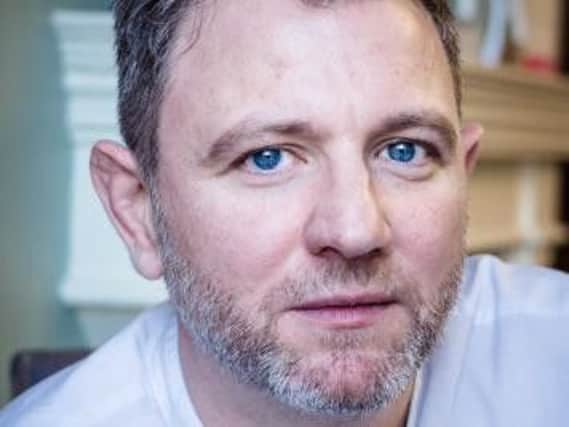Former council painter from Lanarkshire in running for leading UK literary prize


Brian Conaghan, who worked as a painter and decorator in his native Lanarkshire after leaving school with just two O-levels, is one of the contenders for this year’s Costa Book Award.
The former teacher’s teenage novel The Bombs That Brought Us Together tackles issues involving war, refugees and nationalism.
Advertisement
Hide AdAdvertisement
Hide AdIt is inspired both by his upbringing in Coatbridge and the conflict turmoil that was unfolding around the world in 2014 when the book was written, as well as divisions sparked by the Scottish independence reference.
Conaghan, 44, who did not take up writing until he was in his mid-thirties, gave up a career as a teacher after being snapped up by publishers Bloomsbury four years ago.
He is one of four contenders for the £5000 children’s prize and one of three Scottish writers in contention for the five categories in the awards, which are decided in January.
Also in the running are the Edinburgh-based novelist Maggie O’Farrell, for the love story This Must Be The Place, and Perth-born music writer Sylvia Patterson, for I’m Not With the Band, her memoir charting three decades covering the highs and lows of the industry. The five category winners will go on to compete for the overall £30,000 prize.
The Bombs That Brought Us Together revolves around Charlie law, a schoolboy in the fictional “Little Town,” and the events that unfold when he meets fellow 14-year-old Pavel Duda, a refugee from the neighbouring “Old Country."
He said: "The inspiration for the book came in 2004 when there was the Russian annexation of Crimea, the civil unrest in the Ukraine, the Arab Spring was at its height, and then the little thing we had in our country, which seemed to be polarising the nation.
“I wanted to write an allegoric tale about what would happen if one big military power invaded a smaller nation.”
Conaghan, who is now based in Dublin, came to prominence last year when he was nominated for the Carnegie Medal for children’s literature for When Mr Dog Bites, which was inspired by his experience of coping with Tourette’s Syndrome.
Advertisement
Hide AdAdvertisement
Hide AdHe added: “I’ve only really been writing seriously for about 10 years. I’m a bit of a late developer and it doesn’t feel as if I was destined to be a writer.
“I was working out in Italy before then, teaching English and theatre studies in high schools. Before that I had co-founded a theatre company, Vanishing Point, and tried to live the life of an actor for a couple of years, but I was rubbish and didn’t really have the stomach for it.
“I came back from Italy to do a creative writing course at Glasgow University and was teaching three days a week. My wife’s Irish and I was over teaching in Dublin when I got the contract with Bloomsbury. I had only had one book published before by a very small company, but before that I had 217 rejections. I’ve annually got three unpublished books.
“But if you want to do anything creative you are going to have to face rejection along the way. It is very rare that you just break through. It’s like everything. You make mistakes when you first start something, you are just a novice. You’re an apprentice and you’re learning about your craft. You’re not going to be a master juggler unless you drop your balls a few times.”
FULL SHORTLISTS FOR THE COSTA BOOK AWARDS
Novel Award
Sebastian Barry for Days Without End (Faber & Faber)
Maggie O’Farrell for This Must Be the Place (Tinder Press)
Sarah Perry for The Essex Serpent (Serpent’s Tail)
Rose Tremain for The Gustav Sonata (Chatto & Windus)
First Novel Award
Susan Beale for The Good Guy (John Murray)
Kit de Waal for My Name is Leon (Viking)
Guinevere Glasfurd for The Words in My Hand (Two Roads)
Francis Spufford for Golden Hill (Faber & Faber)
Biography Award
Keggie Carew for Dadland: A Journey into Uncharted Territory (Chatto & Windus)
John Guy for Elizabeth: The Forgotten Years (Viking)
Hisham Matar for The Return: Fathers, Sons and the Land in Between (Viking)
Sylvia Patterson for I’m Not with the Band: A Writer’s Life Lost in Music (Sphere)
Poetry Award
Melissa Lee-Houghton for Sunshine (Penned in the Margins)
Alice Oswald for Falling Awake (Jonathan Cape Poetry)
Denise Riley for Say Something Back (Picador)
Kate Tempest for Let Them Eat Chaos (Picador)
Children’s Book Award
Brian Conaghan for The Bombs That Brought Us Together (Bloomsbury)
Patrice Lawrence for Orangeboy (Hodder Children’s Books)
Francesca Simon for The Monstrous Child (Faber & Faber/Profile Books)
Ross Welford for Time Travelling with a Hamster (HarperCollins Children’s Books)